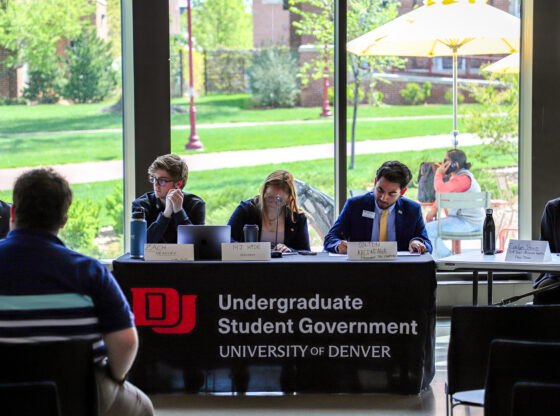After traveling to the Supreme Court on Dec. 5, 2017, Dave Mullins, DU Class of 2005, and husband Charlie Craig presented the story of their civil rights battle to a crowd in Lindsey Auditorium on Tuesday, Oct. 9. Mullins and Craig just finished a six-year long process in the courts after experiencing public discrimination on the basis of their sexuality. DU’s College of Arts, Humanities and Social Sciences (CAHSS) hosted the event, excited to bring back an alumnus of the college and connect students to a significant current event.
Mullins said, “I’ve been so honored to be back on campus today speaking to people. My time at DU is one of the most cherished times of my life, and it’s really special to get to come back here and speak.”
Mullins and Craig shared with the audience what it was like to be at the center of media attention, act as advocates for their community and appear at the Supreme Court. Along with simply telling the story of what it was like to go into the Supreme Court and interview on famous morning talk shows, Mullins and Craig answered audience questions and offered advice on how to fight for something one cares about. Although they lost their case in a 7-2 decision, ruled on June 4, 2018, Mullins and Craig still felt empowered from their experience and more connected to the LGBTQ community than ever before.
“We were hearing all these stories. We were hearing this support in these stories and we were like, ‘We have the voice and we have this platform, so we have to do it for the movement.’ Neither of us were ready and neither of us knew what was going to happen,” said Craig.
The triggering event for their case, referred to as Masterpiece Cakeshop v. Colorado Civil Rights Commission, occurred in July of 2012 when Mullins and Craig walked into Masterpiece Cakeshop in Lakewood, Colo. to inquire about a wedding cake. After talking with the baker, Jack Phillips, it was revealed that Phillips would not make a cake for a same-sex wedding, as it went against his Christian faith. Later that night, Mullins composed a Facebook post. Craig explained, “Every time [Dave] gets really frustrated about something he’s like, ‘I’m going to write a strongly worded letter.’ He never did until this moment, though it just turned out to be a Facebook post.” Soon enough, Mullins’s Facebook post went viral, and Mullins and Craig were bombarded with messages of support from all across the world. Within a few days they were contacted by a lawyer from the American Civil Liberties Union (ACLU), who asked if they wanted help filing a complaint, as it sounded like the interaction violated Colorado’s anti-discrimination act.
This complaint turned into the lawsuit Craig v. Masterpiece Cakeshop, in which the Colorado Civil Rights Commission ruled in favor of Mullins and Craig, declaring that Phillips’s actions violated Colorado law. Phillips appealed this decision to the Colorado Court of Appeals, backed by the Alliance Defending Freedom (ADF). Mullins and Craig received continued support from the Colorado Civil Rights Commission and started to work with the national chapter of the ACLU as well. The Court of Appeals once again ruled in favor of Mullins and Craig. The Colorado Supreme Court did not accept the case, though Phillips then appealed to the United State Supreme Court, which did—about 11 months after Phillips’s request. Eventually, the Supreme Court ruled that the Colorado Civil Rights Commission used language in their arguments and prior rulings that violated Phillips’s freedom of expression.
Mullins and Craig did not anticipate the extent in which their case would go on, but they discussed the honor and pride they felt with having the chance to represent the LGBTQ community. Mullins said, “People don’t see you as an individual; they see you as an omni-representative of your [minority] group. You really have to hold yourself to a certain standard. It’s a lot to deal with, a lot of pressure, because you realize that it’s not about you. It’s not about whether it’s fair or not, it’s about how you can reach people.”
Despite a loss at the Supreme Court, the final decision came with language declaring gay rights as civil rights, which has never been documented beforehand. Additionally, it inspired artwork such as Lonnie Hanzon’s “Equal Threshold” installation that was featured at Denver Pride, which included positive messages on the outside and chalk on the inside for people to spread joy. All documents from the first two hearings are on the ACLU’s website, and the oral arguments from the case and all written decisions from the Supreme Court Justices are available online.











